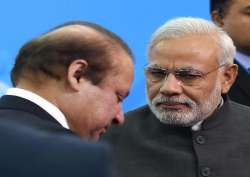‘Writing letters won’t whitewash cross-border terrorism’: India snubs Nawaz Sharif on Kashmir
Reacting strongly to Pakistan Prime Minister Nawaz Sharif’s letters to UN Secretary General Ban Ki-moon and UN High Commissioner for Human Rights Zeid Ra'ad Al Hussein, India today said that writing letters will not “whitewash

Reacting strongly to Pakistan Prime Minister Nawaz Sharif’s letters to UN Secretary General Ban Ki-moon and UN High Commissioner for Human Rights Zeid Ra'ad Al Hussein, India today said that writing letters will not “whitewash cross-border terrorism.”
Asserting that Pakistan has no "locus standi" in Kashmir, it said that arrest of Lashkar-e-Toiba terrorist Bahadur Ali is yet another proof of Islamabad’s continued involvement in cross-border terrorism and infiltration into India, despite several assurances that it will not allow its territory to be used for terrorism against any other country.
"Pakistan has no locus standi in addressing any aspect of the situation in Jammu and Kashmir, which is an internal matter of India, except to put an end to all cross-border terrorism, infiltration and support and instigation to terrorism and violence against India. We are in touch with important interlocutors bilaterally as well as multilaterally to put across the correct picture. Let me also say it does not matter how many letters are written, it will still not whitewash cross-border terrorism," External Affairs Ministry Spokesperson Vikas Swarup said.
He was responding to a question on Pakistan Prime Minister Nawaz Sharif writing to the UN Secretary General and UN High Commissioner for Human Rights, urging for efforts to end the "persistent and egregious violation of the basic human rights" of the Kashmiri people and also to implement UN Security Council resolutions.
"It is an obligation for me as Prime Minister of Pakistan to become the voice of Kashmiris who have been oppressed in Kashmir. I will leave no stone unturned to make the world understand the plight and the legitimate struggle of the people of Kashmir," Sharif had said in a preparatory meeting for the upcoming UN General Assembly (UNGA), attended by senior officials of his government.
Earlier, replying to a written question in Rajya Sabha, Minister of State for External Affairs M J Akbar said India has also emphasised to its international interlocutors that Indian security forces exercised extraordinary restraint, as evident in injury to over 3780 security personnel in mob attacks during the continuing violent protests in Jammu and Kashmir.
On Pakistani terrorist Bahadur Ali's arrest in Kashmir, Swarup said, his interrogation and confession has clearly revealed the details of the kind of training that is provided to such young men, the camps in which they are kept, the weapons that they are provided and, most importantly, the indoctrination that they undergo prior to infiltrating into India.
"Bahadur Ali has also revealed how his Pakistani handlers gave him instructions to mix with the local people, create disturbances and attack police and security forces. His confession proves that the Lashkar-e-Taiba is sending its cadre in connivance with Pakistani security forces, to fuel large-scale agitation in Kashmir.
"Pakistan now stands completely exposed. We have already taken up the matter bilaterally with Pakistan, including our offer to provide consular access to this Pakistani terrorist," Swarup said.
Asked if the foreign secretaries of India and Pakistan were still in touch, the MEA spokesman avoided a direct reply, only saying new dynamics are at play and India cannot be oblivious to it.
India had said in the recent past that though the representatives of the two countries had not met to work out the modalities for resumption of the Comprehensive Bilateral Dialogue, the foreign secretaries were in touch.
Commenting on the recent terror attacks in Pakistan including in Quetta, Swarup said there was no good or bad terrorism.